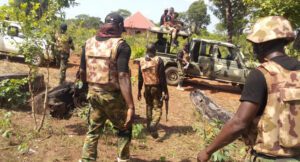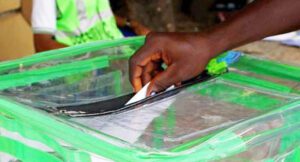
Terrorism financing: How illegal arms sales fuel unrest in Nigeria
The current state of affairs in Nigeria is one of great concern, as the nation is grappling with a severe security crisis that has arisen due to the rampant proliferation of illegal arms in the hands of nefarious actors.
This has resulted in a plethora of violent incidents, including kidnappings, terrorist attacks, and the proliferation of violent cult activities, all of which pose a grave threat to the peace, stability, and sovereignty of the country.
The availability of imported and locally fabricated small arms and light weapons has emboldened extremists and other criminal elements, who have been able to exploit the porous nature of Nigeria’s borders to smuggle in these deadly weapons with ease.
This has created a situation where these groups are able to operate with impunity, wreaking havoc and sowing chaos throughout the land. The consequences of this security crisis are dire, as it threatens to undermine the very fabric of Nigerian society, and poses a grave threat to the nation’s long-term prosperity and stability.
It is imperative that the government takes decisive action to address this issue, by implementing effective measures to curb the flow of illegal arms into the country, and by cracking down on those who seek to use these weapons to perpetrate violence and sow discord.
Only by taking swift and decisive action can Nigeria hope to overcome this crisis and emerge stronger and more resilient than ever before.
There is an urgent and clinical need for President Bola Tinubu’s government to launch a comprehensive programme to mop up illegal arms before criminals push Nigeria over the precipice.
Recently, soldiers attached to Operation Safe Haven discovered an illegal weapons fabrication factory in Pakachi village, Mangu Local Government Area, Plateau State. The recovery of several SALWs, including AK-47 rifles, pistols, and gun barrels, highlights the extent of arms proliferation in the region.
Mangu has become a hotbed of massacres, arson, kidnapping, and rape, and the government must take decisive action to control the flow of arms. The Red Cross reported that 161 persons were killed, and 39,350 displaced in 84 communities in three LGAs, including Bokkos and Barkin Ladi, on Christmas Eve.
The discovery of the illegal weapons factory reinforces the notion that criminals have easy access to weapons. The government must dig deeper, without recourse to sentiments, to permanently quell the incessant massacres in Plateau by controlling arms.
According to a survey by the United Nations Office on Drugs and Crime, the illicit SALWs in Nigeria is at 70 percent or 350 million out of the estimated 500 million in West Africa. This alarming statistic underscores the urgent need for the government to take action to address the proliferation of illegal arms in the country. Failure to do so will only lead to further violence and instability.
Indeed, the proliferation of illegal firearms in the country is alarming. The arms pour in through the official and unofficial borders. In 2017, Customs seized 2,671 weapons at the Lagos ports. These weapons enter the country through official and unofficial borders, with Customs seizing 2,671 weapons at the Lagos ports in 2017 alone. The consequences of this proliferation are dire, with anarchy reigning supreme. Under President Muhammadu Buhari, 63,111 Nigerians lost their lives to violence.
Similarly, during the tenure of Tinubu, 5,135 people were killed, translating to 22.6 deaths per day from May to December. Nigeria is now ranked as the eighth most terrorised country in the world, according to the 2023 Global Terrorism Index.
The Council of Foreign Relations’ National Security Tracker reports that non-state actors kidnapped 4,611 people in 2022. This proliferation is compounded by the absence of effective state policing. In contrast, the United Kingdom, New Zealand, and Australia enacted strict gun control laws after just one mass shooting incident each.
The government must take action to trace the routes of SALWs into Nigeria, intensify strict border controls, and strengthen existing laws while enacting and enforcing other stringent laws against the illegal manufacturing, ownership, and use of SALWs.
Desperate politicians and their agents who supply weapons to hoodlums to compromise election outcomes should not be spared.It is essential to track weapons meant for security enforcement to ensure they do not fall into the hands of criminals.
The government should negotiate with countries where SALWs are imported into Nigeria to help impede such outflow. The disposal of illicit weapons is also crucial. These must be destroyed; otherwise, they may be clandestinely retrieved for violent purposes.
Immediate action is required to address the issue of illicit weapons in the country. It is crucial for all security agencies, including Customs and the Department of State Services, to collaborate effectively in order to conduct a comprehensive and extensive operation to eliminate these illegal weapons.
Security agencies must establish a strong network for sharing intelligence and coordinating their efforts. This will ensure that all relevant information regarding the location and movement of illicit weapons is shared promptly among the agencies.
Also, Security agencies should conduct joint operations to maximise their resources and expertise. This will enable them to cover a wider area and increase the chances of successfully locating and confiscating illicit weapons.
Customs should strengthen border security measures to prevent the smuggling of weapons into the country. This includes increasing surveillance, deploying advanced technology, and collaborating with international partners to curb the influx of illicit weapons.
The Department of State Services should intensify its intelligence gathering activities to identify individuals or groups involved in the illegal arms trade. This will help in targeting specific areas and individuals involved in the proliferation of illicit weapons.
It is important to involve the public in the fight against illicit weapons. Security agencies should launch awareness campaigns to educate citizens about the dangers of possessing or trafficking illegal weapons. This will encourage the public to report any suspicious activities or individuals involved in the illegal arms trade.
The government should review and strengthen existing laws and regulations related to the possession and trafficking of weapons. This will provide security agencies with the necessary legal tools to apprehend and prosecute individuals involved in the illicit arms trade.
Collaboration with international partners, such as neighbouring countries and international law enforcement agencies, is crucial in addressing the transnational nature of the illicit arms trade. Sharing information and coordinating efforts will help in tracking the sources and routes of these weapons.
This will contribute to enhancing national security and promoting peace and stability in the country.




